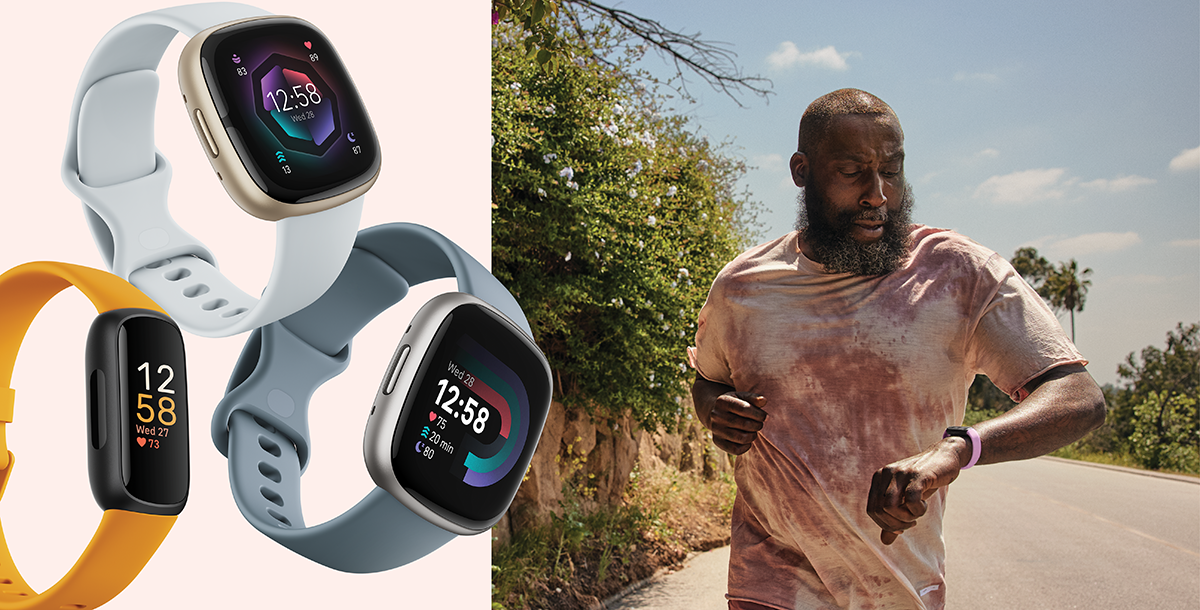Year in Review: The Milestones that Made 2022 Unforgettable
At Fitbit, our mission is to help everyone in the world be healthier — and in 2022, we made some serious progress toward that goal. Last year, we focused on research that helps us update and optimize our products and empower people to live healthier lives. We also partnered with organizations and payers globally, creating collaborations that improve the health and wellbeing of employees and plan members.
We’re thrilled that our growing user base and expanded data sets provide more insights for our partners. And we’re putting those insights to good use to develop an even better experience for Fitbit users, and transforming individual and population health and wellbeing.
So you can see why we’re excited. Before we ramp up for even more progress in 2023, let’s look back at some highlights from the past year.
Research that changes lives
Researchers made some critical discoveries in 2022 that revealed the potential for Fitbit to improve physical and mental health. A study from the All of Us Research Program, a National Institutes of Health initiative, showcased the connection between daily physical activity and lower rates of chronic disease. The study was one of the longest and largest of its kind, with researchers monitoring the Fitbit data of more than 6,000 participants for a median of four years.
According to the results, the more steps you take, the better your health. Participants with higher step counts had decreased instances and time-to-event for many chronic illnesses. For example, each increase of 1,000 steps in participants’ average daily step count reduced the risk of type 2 diabetes by 25 percent. To put things into perspective, that’s a better outcome than many prescriptions. Just imagine if doctors could prescribe movement!
Another landmark study showed that wearables can also identify undiagnosed atrial fibrillation (AFib) in addition to preventing disease. The study tracked more than 455,000 participants, and among the 1% who received an irregular heart rate detection notification, 32% had AFib. It was remarkable that 98.2% of the time, participants who received irregular pulse notifications from Fitbit were found to be in atrial fibrillation at the time of the notification.
The study was powerful, and seeing how the technology affects individuals is just as impactful. We also learned the story of Don Morrell, whose Fitbit helped uncover a heart defect and thoracic aortic aneurysm. “If I had never used the ECG feature on my Fitbit, I likely would not have learned about my two heart conditions,” Morrell said. “That knowledge will play a major role in my chances of having a longer and healthier life.”
Don’s story demonstrates the power of atrial fibrillation detection. What’s even more powerful for health plans and employers that may be offering Fitbit as a benefit is that an independent study published in JAMA suggests that atrial fibrillation detection by wearables is cost-effective. For Medicare Advantage plans, it can help with appropriate risk stratification. For example, the CMS-HCC Relative Factors range from 0.25-0.38 for atrial fibrillation, and is comparable to that of an acute heart attack.
Physical health wasn’t the only area researchers tackled. MindFi, a B2B mental health and wellness platform, partnered with Fitbit to explore how wearable devices can positively impact mental and physical health. The 10-week study, which focused on teachers in Singapore, integrated the MindFi app with Fitbit devices to monitor participant activity levels, sleep, and heart rates. The combination proved powerful, with 60% of the teachers reporting improved overall wellbeing and 58% reporting decreased depression.
More innovation in the works
While we celebrated the results of the above studies last year, we know there’s still more to do. In September 2022, Fitbit and Google Cloud debuted Device Connect for Fitbit, which makes data from consenting users available to healthcare and life sciences organizations via the Fitbit Web API. Organizations can leverage the data to help accelerate time to insights and action for use cases such as improvements in population health, advancement of clinical research, and support for chronic disease management.
The launch of the Google Health Equity Research Initiative was another 2022 highlight. The initiative aims to advance health equity research and improve health outcomes for groups impacted by health disparities. To support their research projects, researchers at universities and nonprofits applied for awards, including funding, Fitbit devices, Fitabase services, and Google cloud credits. The 2022 awardees have been selected and, while they’re still under wraps for now, we’re looking forward to publicly announcing them soon.
Features to support health outcomes
All of this research helps improve our products, and that’s great news for Fitbit customers, partners, and users. An example: the previously mentioned AFib study contributed to an FDA-approved algorithm that powers Fitbit’s Irregular Heart Rhythm Notification feature, which debuted last year. When users turn on the feature, their Fitbit device collects and analyzes heart rhythm data looking for signs of AFib. If the device detects an irregularity, it sends a notification.
We also introduced Sleep Profile, which helps Fitbit Premium users understand and manage their sleep. The feature analyzes sleep over a month to determine habits and trends. Users can evaluate their sleep based on ten key metrics, then access guidance to improve their sleep quality and patterns.
Device innovations provide another way to boost the wellbeing and health of the broader population. We introduced the next generation of Fitbit devices last fall, along with various updates that can help drive engagement and improve health outcomes. The devices not only offer sleek designs and extended battery life, but exciting new innovations like the new Body Response sensor that measures continuous electrodermal activity (cEDA), for all-day stress management right from your wrist. 25% of our users already use the EDA Scan app weekly and 70% of users see a reduction in their heart rate during a two-minute session. With cEDA, users can now go beyond a snapshot of stress levels and begin to understand their personal patterns over time, allowing them to better manage stress.
Last but not least, we rolled out new endpoints for researchers using our Web API. The available participant data now includes Heart Rate Variability (HRV), SpO2, breathing rate, sleep logs, active zone minutes, and more, enabling researchers to understand more about population health, interventions, and post-op progress.
Partnerships that make a difference
Last year, we focused on establishing connections and partnerships that dramatically expand access to wearable devices and the health benefits they provide in the U.S. and beyond – from healthy behavior change to chronic condition management for seniors and other at-risk populations.
We collaborated with Pretaa, Inc. to incorporate Fitbit devices and services into Pretaa’s substance abuse recovery platform. Pretaa analyzes information from wearable devices worn by people recovering from substance abuse. The company plans to use Fitbit’s platform to help drive behavior change and healthy habits among participants.
MercyOne, an Iowa-based health system, took a similar approach. The system launched a subscription-based health and wellness platform in 2022 that incorporates Fitbit device data. The health system leaders hope the program promotes preventative care among participants and enables individuals to share data with healthcare providers, who can use the information to provide personalized guidance.
Babylon, a global value-based care company, is also offering Fitbit devices to eligible members so that they can monitor activity levels, sleep patterns, and more to improve their health proactively. The company targets members at risk for health conditions who would not typically have access to wearables.
Health plan members and patients weren’t the only ones benefiting from increased access to Fitbit devices and data in 2022. The Orlando Veterans Administration Health System (OVAHS) recently shared the results of a pilot program that provided 50 nurses with Fitbits so that they could better monitor their health. The program led to a reduction in nurses calling out from work and an improvement in the overall health of the participants. In a report from the U.S. Department of Veterans Affairs, float pool nurse Olivia Chase said that the program and the use of Fitbits has improved “my mood and has even increased my activity outside of work. I am now even spending more time being physically active with my family.”
Creating a global impact
Our mission is to improve population health worldwide. Last year, we developed some innovative partnerships to expand our reach. From Spain to Singapore, we partnered with hospitals, payers, universities, pharmaceutical companies, and more to better understand health and help people make holistic changes that improve wellbeing.
For example, in Ireland, we teamed up with Western Trust to help launch the CHARLI app, our revolutionary virtual care platform for cardiac rehabilitation. The app leverages Fitbit data to help improve patient health and outcomes.
In England, we proved that health education and cabin workouts can improve the health of truck drivers with Loughborough University and are excited to share these findings with more professional drivers.
In the Hague, Netherlands we are helping the Haga Teaching Hospital better understand patterns and abnormalities associated with certain heart conditions.
In Spain, we are helping to screen for heart failure and remotely monitoring those subsequently placed on a cardiac care pathway with Idoven and AstraZeneca.
In Singapore, we have partnered with StarHub telecoms to launch the first health tracking app to manage pre- and non-complex conditions.
In Indonesia, we partnered with Bio Farma, Indonesia’s state-owned pharmaceutical company, together with Google Cloud and ConnectedLife, to create a new digital health initiative. Indonesian Fitbit users can upload their data to an online platform and receive a Wellness Score, which provides insights and recommendations for improving health.
In India, Manipal Hospitals, one of India’s largest healthcare services providers, announced that they would leverage Fitbit’s wearable technology and ConnectedLife’s virtual platform to monitor high-risk surgery patients. The wearables will give healthcare teams a holistic view of patient progress after hospital discharge.
And finally, in the UAE, we have partnered with metabolic disease management platform, GluCare, to move diabetes care from episodic to continuous behavior change. We’ve also partnered with the UAE’s first wellness insurance platform Wellx to incentivize healthy behavior change.
Keeping the momentum going
While we’re thrilled about everything accomplished in 2022, we’re even more excited about what we have planned for 2023. There’s a lot of great work to be done and we’re looking forward to another year of groundbreaking research, innovation, and strategic partnerships. And while each year brings new changes, our commitment to our mission of a healthier world remains as strong as ever.
Here’s to a healthy and happy new year!



